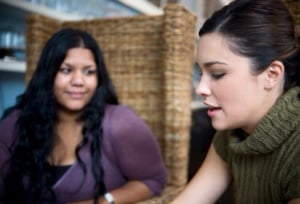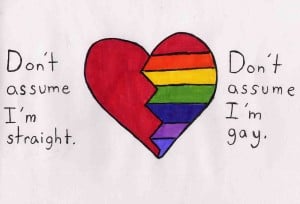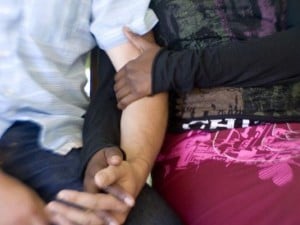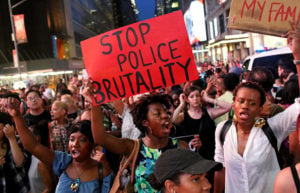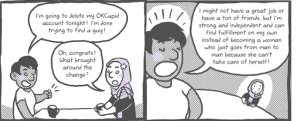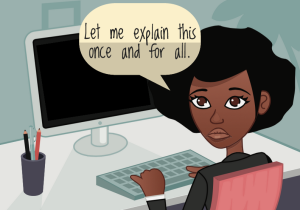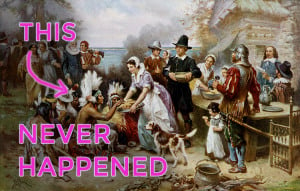
A painting of Pilgrims and Indigenous people on Thanksgiving has an arrow reading “This never happened.”
Originally published on Change From Within and cross-posted with their permission.
“The long, dark shadow of genocide affects all of us.” – Waziyatawin, Ph.D.
I struggle with Thanksgiving as a holiday. I simultaneously love and hate it.
I love that it brings families together and that it is a time for pause in our busy lives to give thanks for the many wonderful things around us. Neither of those things happen often enough.
Simultaneously, though, it is a holiday that perpetuates lies and hides the genocide of Indigenous people on this continent.
The story we’ve been told about the first “Thanksgiving” is a farce. It’s a lie that is told by a White-dominant culture to help itself feel better about the fact that we are living on lands that were stolen from Indigenous tribes through a careful process of genocide.
To better understand this lie and its implications, check out Judy Dow (Abenaki) and Beverly Slapin’s piece, “Deconstructing the Myths of the First Thanksgiving.” It’s important that we understand the true history of what we celebrate.
As we take stock of that for which we are thankful, let us also take time to consider how we can be accountable. How can we be accountable allies to the Indigenous people on whose land we now reside? Here are a few suggestions for your Thanksgiving:
1. Learn About the Modern-Day Struggle of the Descendants of the People Who Helped the Pilgrims
Rather than participating in this modern form of blackface:
Consider taking some time to learn about the modern-day struggle to reclaim the Wampanoag language by the descendants of the people who ensured the survival of the “Pilgrims” and went on to regret doing so.
”We Still Live Here” is a film that chronicles this journey, one being undertaken by more and more Indigenous people around the U.S. who were forcibly stripped of their language in an act of cultural genocide. Here’s a clip:
2. Support Indigenous People’s Efforts to Reclaim Their Language
Now that you know a little more about one Indigenous group’s effort to reclaim their language, support efforts of all Indigenous people to do the same.
There are likely groups near you doing this work if you search around, but you can also donate to the American Indian Studies Department at the University of Minnesota, one program that is attempting to teach more Dakota youth their language before it goes extinct.
3. Lobby For the Return of State and Federal Lands To Indigenous People
These are lands that are commonly-owned, so they are a great start in the process of returning land to the Indigenous tribes from which it was taken.
Australia’s Aboriginal activists won an incredible victory in land return, so there is precedent for the U.S. to follow! We as individuals can write our representatives demanding that they champion such efforts.
4. Lobby For Colonial Symbols To Be Removed From Our Communities
Is there a statue in your town of a “hero” who contributed to the genocide of local Indigenous tribes? Write the local government to have it removed!
Is your local high school the “Warriors” or the “Fighting Sioux?” Write them to ask for a change in mascot! Here’s a piece I wrote on the subject of mascots a few years back to give you a little help in explaining why this needs to change.
5. Contribute To Buy Back Programs
Indigenous groups around the U.S. are organizing to buy back lands that were forcibly taken from them or “bought” for far less than their value.
Support these efforts! Here’s one Buy Back effort that you can consider supporting! Whether it’s $5 or $500, please give (maybe in lieu of presents for Christmas). Better yet, if you own land, consider a donation of (at least) part of the land to the Indigenous tribe that once lived there.
Because of the nature of wealth disparity in the United States, if Indigenous people must only look to other Indigenous people to fund these initiatives, enough money will never be raised. When your ancestors had everything stolen from them, it’s pretty hard to accumulate trans-generational wealth, and thus pretty hard to give en mass to programs like the one I linked to above.
White people, we have a responsibility to support these efforts! Perhaps one way is to pay the same amount per year to buy back programs that you pay to the state in property taxes.
Many of these suggestions were adapted from a keynote given by Waziyatawin, Ph.D. at the recent Overcoming Racism conference. So with her wisdom in mind, I will leave you with the central question of her most recent book (please consider picking up a copy or the ebook):
“What Does Justice Look Like?”
Unless we begin to envision real, concrete actions that we can take to realize justice, it will never happen. Above are 5 simple suggestions, but they are only the beginning. The question is:
What does justice look like to you?
[do_widget id=”text-101″]
Jamie Utt is a Contributing Writer at Everyday Feminism. He is the Founder and Director of Education at CivilSchools, a comprehensive bullying prevention program, a diversity and inclusion consultant, and sexual violence prevention educator based in Minneapolis, MN. He lives with his loving partner and his funtastic dog. He blogs weekly at Change from Within. Learn more about his work at his website here and follow him on Twitter @utt_jamie. Read his articles here and book him for speaking engagements here.
Search our 3000+ articles!
Read our articles about:
Our online racial justice training
Used by hundreds of universities, non-profits, and businesses.
Click to learn more







